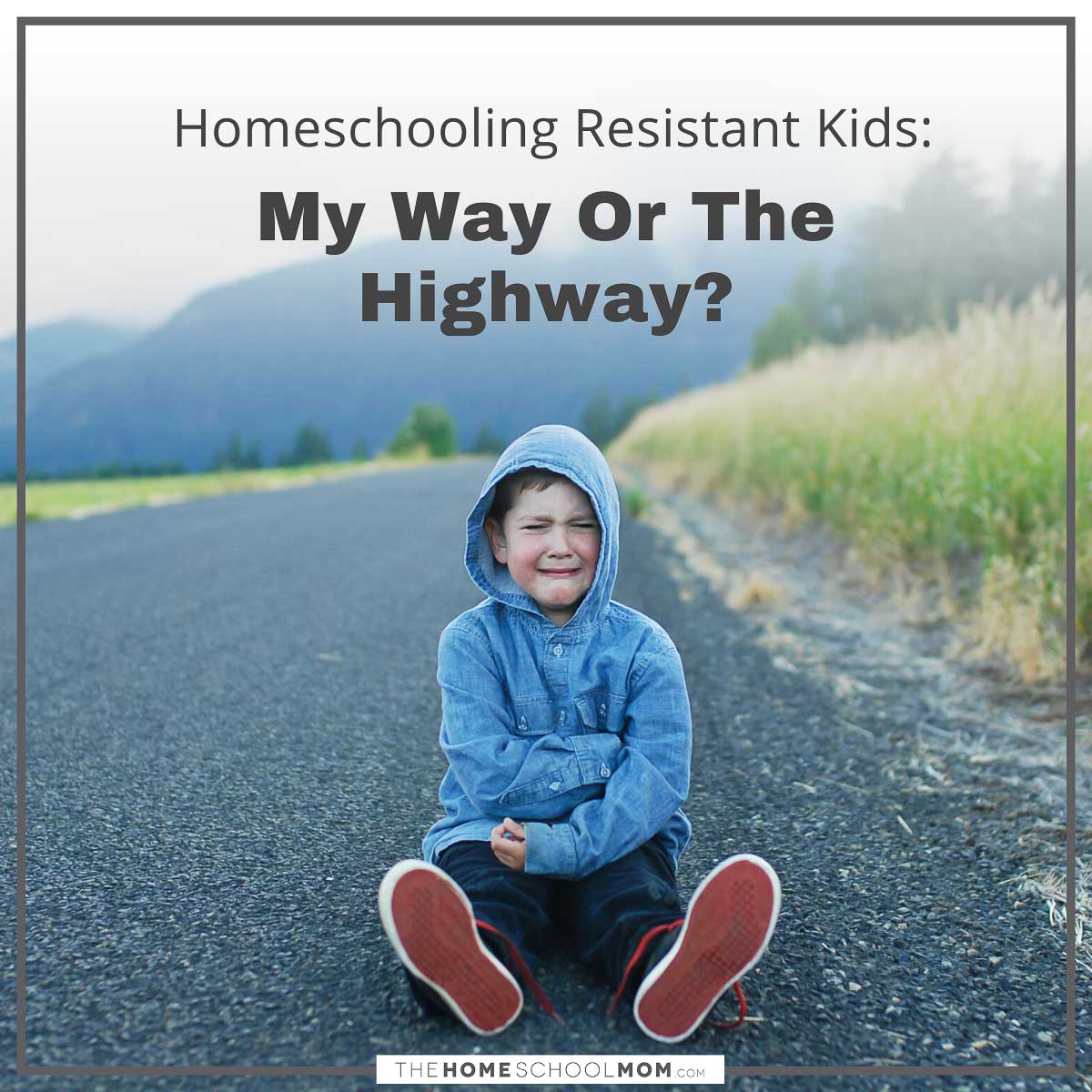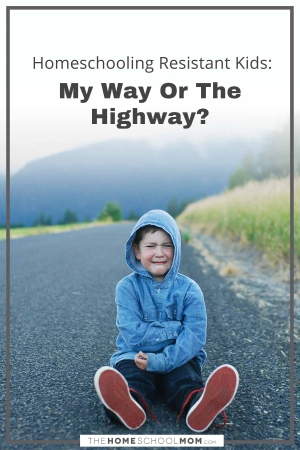Does your child really only have two choices? To homeschool your way or to attend regular school?
I keep reading this comment on social media when parents are looking for support for homeschooling resistant kids. A slew of parents will respond with the equivalent of this statement: "I've made it clear to my kid: cooperate with homeschooling or go back to school. They can choose which one."

So well meaning.
As if a parent's firm boundaries and act of limiting choices have the ability to coerce cooperation in all cases.
In some kids? Sure. They didn't like public school or don't want to give up homeschooling, so they'll cooperate with the parents' program to get out from under the threat. It doesn't even bother them that much. They respond to their parents' threat of school by "shaping up" to homeschool as directed.
Or, some kids choose to go to school and find the new setting works for them: another happy ending!
The parent feels good about having gotten the kid to cooperate one way or the other. The parent then extrapolates their solution to all families and gives overgeneralized advice.
Do firm boundaries and limiting choices work for all kids? Not so much.
Here are a few things that can happen that are less happy:
- The child continues to resist homeschooling, the parent makes good on the threat to send them to school, and then the child resists school, too. Now what?
- The child continues to resist homeschooling, the parent makes good on the threat to send them to school, and then the child goes through the motions of being "successful enough" in school—meanwhile stuffing down resentment, misery, or both. How does this turn out?
As we've talked about before, resistance and resentment are red flags of homeschooling. Treating them at surface level by compelling a behavior misses the communication that is indicated by the resistance.
Would it be convenient and feel . . . normal . . . if our kids didn't resist homeschooling or school? Sure.
But many kids don't come with convenience for their parents, and "normal" things like "just doing your math" or "just get up and go to school" are not enforceable by "laying down the law" to those kids—no matter how many times it works in kids with different dispositions in other situations in someone else's family.
Here's the thing . . .
You can't change your kid.
You can change your homeschooling.
Besides giving your child the choice between homeschooling your way and going to school, what could you change about your homeschooling?
Consider changing the who, what, when, where, why and how of homeschooling:
- Maybe who works with your child could change, or maybe you could invite more homeschooled kids in to make learning social.
- Maybe you could change the what to help your child learn about topics they're interested in.
- Maybe you could change when and where with a different schedule or setting. (Homeschool at night, anyone?)
- Maybe you could change how you homeschool, by updating your approach or curriculum.
- You could even adjust your expectation about why you are homeschooling.
Perhaps your child doesn't share your priority of "getting into a good college" right now, so they're not motivated by your why. Maybe your why needs to be about relationship or healing or helping a child discover self-motivation. Homeschooling allows us to leverage the power of what needs to meet now.
When you read that my-way-or-the-highway advice on social media, you may recognize the parent making the comment definitely is not homeschooling your child.
You don't have to beat your head against the wall even harder or set up false choices that you are beginning to understand as damaging to your relationship without producing the desired result.
You can change something. That something may even be in yourself. Changing homeschooling often gets to the root of problems and helps resolve resistance.
It might not, but that's why we also have taking walks, midnight talks, and therapy.




 A popular speaker at homeschooling conferences, business groups, and parents’ groups, Jeanne Potts Faulconer homeschooled her three sons in North Carolina, Mississippi, and Virginia for twenty years. Holding her Master of Arts degree in Communication, Jeanne conducted portfolio evaluations for Virginia homeschoolers for evidence of progress for many years. Jeanne is a former college faculty member, former editor for several publications, news correspondent for WCVE, and former director of Brave Learner Home. She is the contributing editor for TheHomeSchoolMom newsletter and writes the popular Ask Jeanne column addressing homeschool parents' questions here at TheHomeSchoolMom.
A popular speaker at homeschooling conferences, business groups, and parents’ groups, Jeanne Potts Faulconer homeschooled her three sons in North Carolina, Mississippi, and Virginia for twenty years. Holding her Master of Arts degree in Communication, Jeanne conducted portfolio evaluations for Virginia homeschoolers for evidence of progress for many years. Jeanne is a former college faculty member, former editor for several publications, news correspondent for WCVE, and former director of Brave Learner Home. She is the contributing editor for TheHomeSchoolMom newsletter and writes the popular Ask Jeanne column addressing homeschool parents' questions here at TheHomeSchoolMom.
Leave a Reply